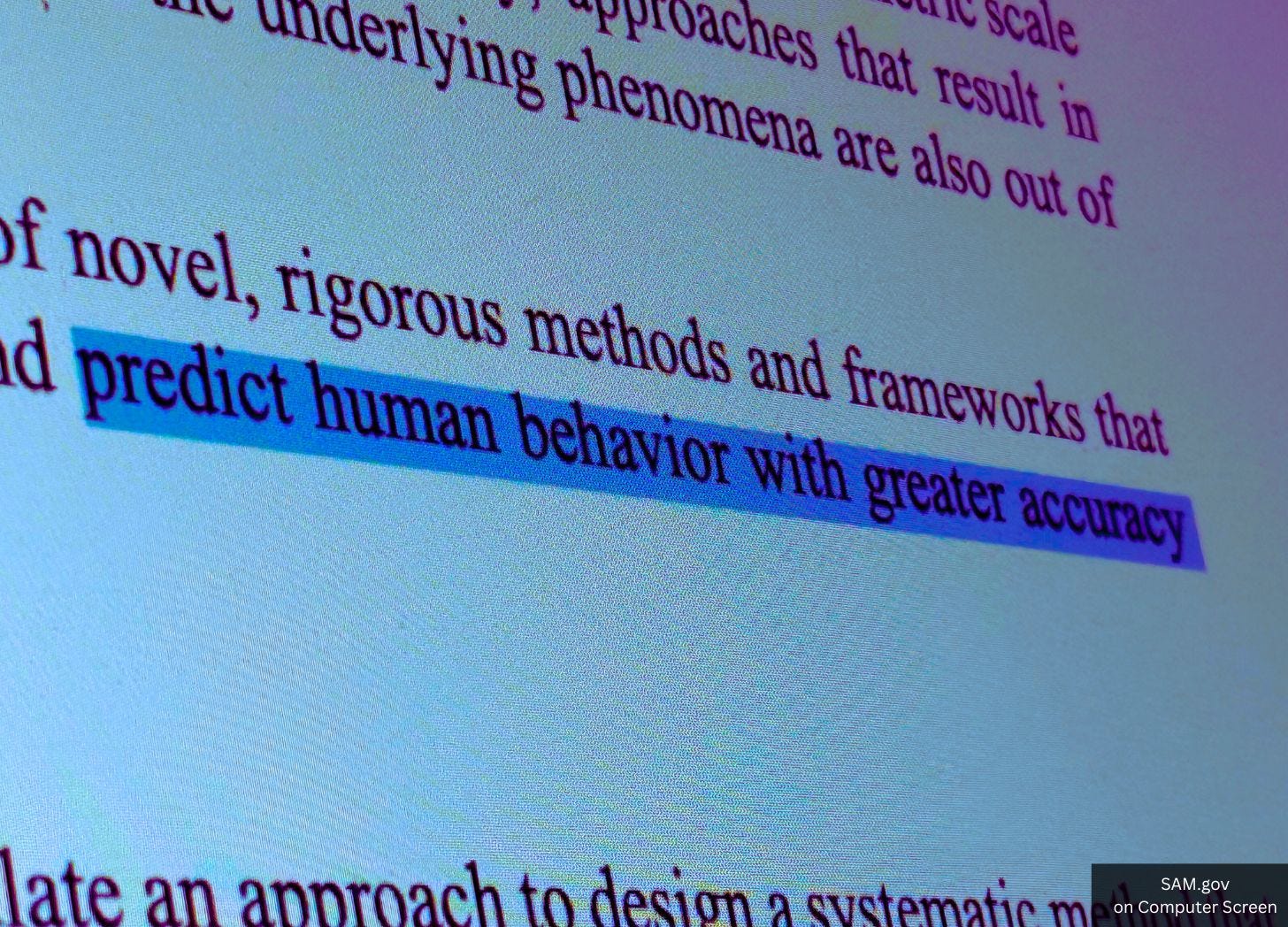DARPA's New 'MAGICS' Program Seeks AI to 'Predict' and 'Forecast Human Behavior'
What could possibly go wrong?
This article originally appeared on Jon Fleetwood’s Substack and was republished with permission.
Guest post by Jon Fleetwood
The U.S. Defense Advanced Research Projects Agency (DARPA) has launched a disturbing new research program called MAGICS (Methodological Advancements for Generalizable Insights into Complex Systems), which openly seeks to develop artificial intelligence tools to predict and forecast human behavior on a large scale.
This comes just weeks after the House passed the sweeping “One Big Beautiful Bill Act,” which strips all 50 states of their right to regulate AI for the next decade, while the FDA simultaneously approved rules allowing researchers to access Americans’ blood, DNA, and medical data without consent.
According to the agency’s new solicitation document (DARPA-EA-25-02-05, Amendment 01), DARPA acknowledges that current AI and statistical tools fail to accurately model how humans behave:
“Despite many attempts, results have failed to meet expectations. Progress has stalled because current statistical methods cannot create models that remain valid when applied to evolving, open, time varying, recursive, reactive, non-ergodic systems.”
Now, the agency is offering government funding to researchers to develop new tools for modeling and forecasting human behavior.
#ad: Don’t wait for permission to protect your health.
Skip the corporate giants and buy directly from the ranch.
Rancher-Direct beef has:
🚫 No mRNA
🚫 No GMOs
🚫 No antibiotics
✅ 100% grass-fed
✅ Raised by real American ranchers
DISCLOSURE: This is an affiliate link. I may earn a commission if you make a purchase here, at no additional cost to you.
DARPA bluntly states its goal:
“to spur the development of novel, rigorous methods and frameworks that advance our collective capacity to understand and predict human behavior with greater accuracy and nuance.”
Even more directly, DARPA writes:
“The MAGICS ARC calls for paradigm-shifting approaches for modeling complex, dynamic systems for predicting collective human behavior. Addressing this challenge will require the design of entirely new methodologies, metrics, tools and theoretical frameworks that can more accurately and reliably forecast human behavior by addressing the limitations and complexities that current methods struggle to capture.”
In other words, DARPA is openly seeking to build AI tools for preemptively predicting how populations will act under changing conditions—something many would view as a dangerous step toward social control and even “pre-crime” technologies.
The MAGICS solicitation highlights many failings of today’s approaches, noting that existing models “fail to account for changing conditions or new information, further resulting in decreased predictive performance.”
To overcome these barriers, DARPA wants researchers to tackle:
“lack of systematic methods to determine the limits of inference for a given source of data”
“lack of effective methods to quantify the alignment between observable indicators and latent constructs”
“failure to generalize across contexts due to unclear patterns of evolution, degradation, or strengthening of underlying relationships”
“Current methods struggle to capture the complexity and reflexivity of social phenomena (i.e., systems often change as a result of being studied)”
DARPA demands that new approaches work on “open-world systems and data sets,” not lab simulations.
The solicitation warns that “toy problems or constrained and simulated systems are out of scope.”
Researchers are expected to submit plans to:
Identify “limits or boundaries of inference from a data source(s) in understanding social systems”
Benchmark against existing methods
Include a clear “evaluation plan” to test predictive validity against “ground truth”
DARPA calls this effort a search for:
“new methods and paradigms for modeling collective human behavior capable of overcoming limits of statistical approaches to accurately predict complex social phenomena and capture the dynamics of evolving, open, time varying, recursive, reactive, non-ergodic systems.”
This U.S. military research agency wants to build AI tools for anticipating, predicting, and forecasting human behavior at scale—something eerily reminiscent of the “pre-crime” systems depicted in dystopian fiction like Minority Report.
The MAGICS solicitation closes June 30, 2025.
Copyright 2025 Jon Fleetwood



